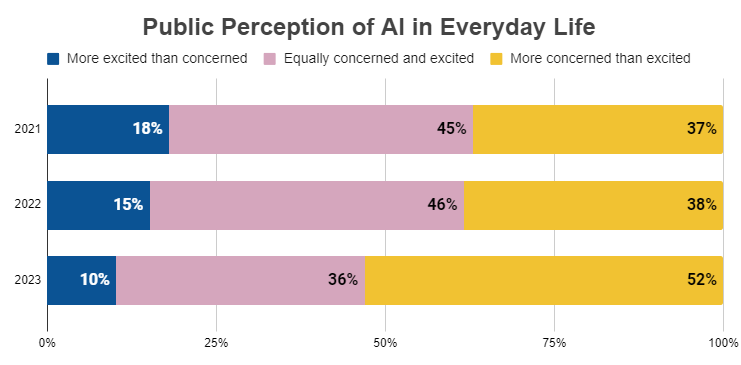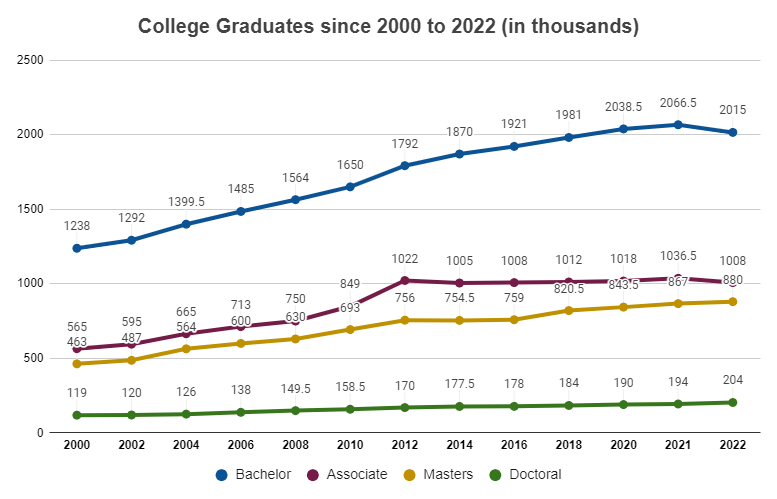Artificial intelligence has become an indispensable tool, with new AI-powered services launching daily. Given its popularity among both developers and users, it's no surprise that AI is beginning to impact the job market as well.
There are thousands of jobs, many of which have already undergone significant changes due to AI implementation. For some industries, this means the development of entirely new professions; for others, it means the elimination of old ones. Some industries now need to adapt to working alongside AI. In this article, we’ll take a closer look at how AI is transforming the job market, identify some professions that may be at risk of being replaced, and offer advice on how to navigate these changes.
Should You Be Worried?
There is a growing opinion about AI’s rapid growth and popularity. As more people discuss it online, various theories and fears continue to emerge. Speculators paint a picture of machines taking over the planet and YOUR job. It’s no wonder so many people are afraid of being replaced by a box of metal and microchips.

However, let’s take a closer look at the situation and provide evidence that AI is not a threat but rather a very useful tool:
- AI cannot replace all jobs, at least not in the near future. It’s simply not advanced enough to compete in fields where human emotional intelligence, creativity, and problem-solving skills are crucial.
- AI is a system, and like any other system or machine, it needs to be operated by humans to function properly. Not only is AI unable to replace many professional roles, but it also creates new job opportunities. According to a 2020 World Economic Forum report, approximately 97 million people will work in roles that bridge the gap between humans and machines in the AI field.
- AI can make mistakes, have errors, and experience crashes, just like humans. It’s not the perfect, irreplaceable solution everyone might have hoped for. Instead, it’s a convenient tool that helps perform some tasks faster and more accurately – that’s all.
- Many people are concerned about AI gaining popularity and potentially taking over their jobs
- According to Pew Research Center, 52% of surveyed individuals are more worried than excited about AI in daily life
- However, AI is more likely to create new job opportunities than to replace existing ones
- According to the World Economic Forum, around 97 million people will work in AI and machine learning roles
Insights into Positions at Risk
While AI is not necessarily a threat to many workers, certain professions and roles may struggle to maintain their relevance. As mentioned before, AI lacks skills such as creativity, complex problem-solving, and emotional intelligence (at least for now). Therefore, roles that AI could potentially replace typically involve either repetitive manual labor or knowledge that a machine can quickly acquire. Here are some examples:
Customer Service-Related Roles
Customer service can vary widely: some customer service specialists handle repetitive tasks, such as order or transaction processing, while others focus on client communication, troubleshooting, and diverse assistance. AI is more likely to take over the former, handling the routine tasks, rather than the latter, which involves more complex and varied interactions:
🛒 Cashiers
The role of a cashier is becoming increasingly rare. Most people now prefer self-service checkouts when available. It’s only a matter of time before all cashiers are replaced by machines.
💬 Online Support
We use the Internet daily to make purchases, pay for orders, and seek support through chat systems. Increasingly, AI-based support chats are being implemented, where you first interact with a chatbot. If the chatbot cannot resolve your issue, you can then escalate it to a human operator. While these bots may not be as advanced as desired yet, it won’t be long before they become more intelligent and capable of handling a broader range of inquiries.
🚛 Drivers
Tesla is leading the way in automated driving technologies, setting a precedent for other companies to follow. There is a growing possibility that roles such as taxi and truck drivers may eventually be partially replaced by fully autonomous vehicles.
- Сustomer service is among the fields facing shortages due to AI development
- Cashiers are already being replaced by self-service checkouts. Online support specialists are increasingly being replaced by chatbots.
- Taxi and truck drivers are at partial risk of job shortages due to the rise of automated driving technologies
Roles Involving Repetitive Manual Labor
Repetitive tasks that involve minimal processing and communication can be easily replaced by AI. This is especially true for straightforward manual labor in settings like factories and construction sites.
🏭 Assembly Line Workers
Tasks such as packaging, parts assembly, and quality control – essentially any repetitive line-based work in factories – can be easily handled by AI machines.
🚚 Material Handlers
AI-driven forklifts and automated guided vehicles (AGVs) are capable of transporting materials efficiently around factories or warehouses.
🚧 Construction Site Laborers
AI-powered machinery can also perform repetitive construction tasks, such as bricklaying and concrete pouring.
♻️ Sorting and Recycling Workers
Automated systems can efficiently sort materials for recycling or waste management, minimizing the need for human labor in hazardous environments.
- Factory workers may also be at risk, including roles such as assembly line workers, sorters, quality control inspectors, material handlers, and loaders
- Construction site workers face potential job threats, especially in roles that involve only manual labor, such as bricklaying and concrete pouring
Professional Service Roles
Professional service roles can vary greatly depending on the field of expertise and the level of communication with customers. While comprehensive knowledge in the field may seem to ensure your value as a specialist, the ability to recall large amounts of data is no longer a priority. This is precisely the kind of work that AI excels at. For example:
🏦 Bank Teller
Many of the tasks performed by bank tellers can be efficiently handled by AI, as many are already managed by ATM machines. The remaining tasks involve specific rules and knowledge that AI systems can learn and apply to assist clients effectively.
✈️ Travel Agent
The role of travel agents is becoming increasingly redundant. Today, every travel agency has a website, and numerous apps offer flight tickets, tours, and travel packages. Even if you prefer not to search for the best options yourself, travel calculators can provide several trip options based on your budget, destination, and preferences, leaving little need for human assistance.
💻 Data Entry Clerks
Simple data processing, organizing, storing, and managing tasks are easily handled by AI, as these functions are central to its capabilities. Consequently, the role of a data entry clerk is at high risk of becoming obsolete in the near future.
📊 Loan and Insurance Offices
Risk assessments, insurance application evaluations, creditworthiness analysis, loan application processing, and lending decisions – these tasks can be handled more efficiently and with greater consistency by AI than by humans.
- Professional service roles facing an AI threat generally involve simple analysis and knowledge acquisition:
- Bank tellers: Daily tasks are already partially substituted by ATM machines
- Travel agents: Have been largely replaced by specialized websites and applications
- Data entry clerks, loan officers, and insurance agents: These roles involve tasks that AIs can easily perform, as they do not require specialized human skills
It’s Not All Bad
There is a flip side to the coin that many people either don’t realize or purposely ignore. Technological development is a crucial step for our growth as a species and as individuals. AI development and implementation are simply the next steps. There is increasing evidence supporting the notion that this is not bad news:
Educational Trends
According to the National Center for Education Statistics, in the past 24 years, the number of graduates has more than doubled, with more young people pursuing degrees each year. This shift has significantly impacted the labor force. Difficult, low-paying manual labor is often carried out by immigrants, as locals are increasingly unwilling to accept such jobs for minimal wages. One key reason to pursue higher education is to avoid filling these roles. However, even migrants are now seeking better-paying jobs and are pursuing degrees either in their home countries or in the United States.

In simple terms, the number of people willing to work in factory lines, construction sites, or as cashiers is decreasing. Therefore, using machines and AI to fill these gaps presents a significant solution to this problem.
Emerging Professional Roles
We’ve already mentioned that AI should be operated by a real human. We can compare it to a washing machine: it needs to be loaded, set up, and emptied, and if something breaks, you call a professional to fix it. Similarly, every time new home equipment was invented, people emerged to operate and maintain these machines.
The same applies to AI. Although it's more advanced than a vacuum cleaner, it still requires human oversight to ensure proper operation and to address any issues that arise. This necessity for human management and maintenance is one of the ways AI creates new job opportunities.
Shaping the Future
Since the growth of AI popularity and usage is unavoidable, the smartest move you can make is to learn how to operate it. This will not only ensure that you are up-to-date with new technologies and can use them to streamline your own work, but it will also open the door to entirely new career opportunities if you choose to pursue them.
- Increasingly, more people are earning degrees each year, leading to fewer individuals willing to take on low-paying manual labor jobs. AI serves as the ideal replacement for these vacant roles
- AI’s rapid growth in popularity and development is creating a new reality: Those skilled in AI operation and machine learning are more in-demand than ever before
- The smartest move is to develop the skills needed to work with AI, ensuring that your value as a specialist surpasses that of a machine
Simply put, it's too early to worry about robots gaining control and taking over our planet. For now, that's the stuff of science fiction. Instead, focus on leveraging AI to your advantage. Stop fueling pointless rumors on the internet and start advancing your career with AI!
